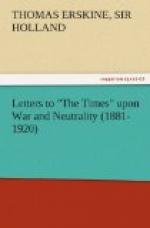We reached General Miles in Puerto Rico by cable, and he was able, through the military telegraph, to stop his army on the firing line with the message that the United States and Spain had signed a protocol suspending hostilities. We knew almost instantly of the first shots fired at Santiago, and the subsequent surrender of the Spanish forces was known at Washington within less than an hour of its consummation. The first ship of Cervera’s fleet had hardly emerged from that historic harbor when the fact was flashed to our capital, and the swift destruction that followed was announced immediately through the wonderful medium of telegraphy.
So accustomed are we to safe and easy communication with distant lands that its temporary interruption, even in ordinary times, results in loss and inconvenience. We shall never forget the days of anxious waiting and awful suspense when no information was permitted to be sent from Pekin, and the diplomatic representatives of the nations in China, cut off from all communication, inside and outside of the walled capital, were surrounded by an angry and misguided mob that threatened their lives; nor the joy that filled the world when a single message from the Government of the United States brought through our minister the first news of the safety of the besieged diplomats.
At the beginning of the nineteenth century there was not a mile of steam railroad on the globe. Now there are enough miles to make its circuit many times. Then there was not a line of electric telegraph; now we have a vast mileage traversing all lands and seas. God and man have linked the nations together. No nation can longer be indifferent to any other. And as we are brought more and more in touch with each other the less occasion there is for misunderstandings and the stronger the disposition, when we have differences, to adjust them in the court of arbitration, which is the noblest forum for the settlement of international disputes.
My fellow citizens, trade statistics indicate that this country is in a state of unexampled prosperity. The figures are almost appalling. They show that we are utilizing our fields and forests and mines and that we are furnishing profitable employment to the millions of workingmen throughout the United States, bringing comfort and happiness to their homes and making it possible to lay by savings for old age and disability. That all the people are participating in this great prosperity is seen in every American community, and shown by the enormous and unprecedented deposits in our savings banks. Our duty is the care and security of these deposits, and their safe investment demands the highest integrity and the best business capacity of those in charge of these depositories of the people’s earnings.




